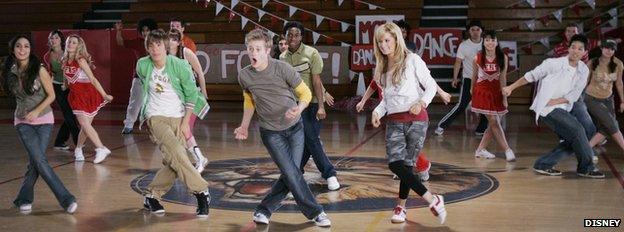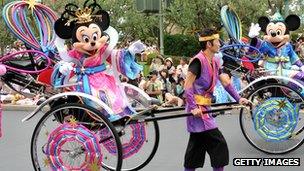Disney: Guarding the legacy in the digital age
- Published

High School Musical rejuvenated Disney ABC's fortunes and became a worldwide smash
Disney is undoubtedly one of the most recognised media brands in the world.
Favourites of the golden age of screen animation such as Mickey Mouse and Dumbo, theme parks across several continents, and hit televisions series including Lost and Hanna Montana, have kept families entertained for nine decades.
"Disney has a fantastic heritage and culture of storytelling," says Anne Sweeney, head of the Disney ABC television group.
For the past eight years she has presided over a remarkable expansion in one of America's most successful entertainment franchises, which has led to her being labelled one of the most important women in television - at a time when television is colliding with the digital age.
It is an era which Ms Sweeney looks upon as a golden opportunity.
Digital challenge
"When I was growing up, media was people huddled around a radio or the television set, but now media is personal," she says.
Media analyst Daniel Waterhouse, at Wellington Partners, says the winners in the fragmented manner in which content is delivered will be those who control what the user looks at when they turn on their device.
"It will be harder for smaller companies to find an audience," he says.
"Whether it is the deal with iTunes in 2005, the launch of ABC.com or the apps we created for the iPad and the iPhone, we are trying to stay ahead of the curve," Ms Sweeney explains.
However, she does say that they made a mistake by not monetising the apps from the beginning.
"TV on the iPad is just TV. It's entertaining but you won't pay serious money for it," she says.
New technology also increases the chances of piracy, which is an ongoing issue not just for the Walt Disney company, but for the entire industry.
"It certainly hurts us when we are pirated, but we have worked to create platforms, together with other companies, to help guard against this and to help provide consumers with our content in the way that they want to receive it," she says.
"Through technology, providing people with legal ways to access our content, and hopefully through some legislation, we will be able to make progress on this front," she asserts.
Disney Vision
The company has faced tough moments but Ms Sweeney is adamant that failure simply empowers innovation.
"Disney's response to the surging popularity of Nickelodeon, was to launch dozens of pilot shows designed by committee to a formula," she says.
"They all failed and Disney became a machine for mediocrity when they should have been focused on quality over quantity," she adds
But then, with a plot described by the author and numerous critics as a modern adaptation of Romeo and Juliet, High School Musical in 2006 became the most successful franchise that Disney had produced.

Disney legends have transcends all cultures and are children's favourites across all continents
At the time, it went against the grain of other forms of popular culture which was increasingly depicting sex and violence.
"That was innovation, not doing what everyone else was doing," says Ms Sweeney.
"So many schools had cut back in their arts programmes and we took a story that was very relevant to kids - the basketball player and the girl who studies too much - and we put them together and gave them some songs to sing, and they danced and found out more about themselves," she says.
"It was really about a universal theme - this is how kids grow up and they discover things about themselves," she says.
Research done by the company showed that children named their mother, father, brother and sister as their heroes, whereas they had fully expected them to opt for the well-known super heroes.
"Disney is an aspirational brand - a kid-driven family brand," she says.
Secret of success
In a world where fads and fashions change on a whim, it is difficult to maintain a winning streak.
"One of the most important things in creating hit television is to find those individual voices, to find people who actually have an idea that is different, that is fresh, that is innovative," she says.
.jpg)
The Disney legacy has always been to appeal to a family-orientated audience
She maintains that the great trick is making sure they are married to the right production staff and that they manage the process deftly.
"Success is attributable to the very talented people who have a very clear vision of where they want to go with these shows," she says.
The digital age has helped the Disney brand image stay at the forefront, says Ms Sweeney.
"When we started producing Lost, we didn't have the advantage of the internet the way we do today," she notes.
"But by the end of Lost, the digital age was alive, the internet was on fire, and Lost had a following unlike any other show that I can remember," she says.
She says that the internet changed people's relationship with Lost.
"Because of the gap between when the episodes were produced and when they went on air, the comments didn't affect the daily production of the show," she says.
"But what happened was the show was kept alive even when it was on hiatus during the summers. So the group of people who loved Lost stayed together as a community even when the show was not on air, and they continued to talk about," she adds.
With the continued success of series such as Phineas and Ferb and Desperate Housewives, Ms Sweeney believes Disney ABC has a proven formula which should keep people talking about the shows for many years to come.
- Published7 August 2012
- Published19 June 2012